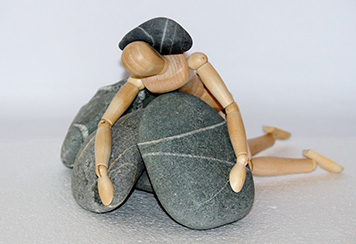Stress undermines both fitness and wellness
The word “stress” conjures negative images in most people’s minds. For good reason: Many types of it are not only unpleasant, but research shows it adversely affects all the various modalities of health.
Stress can cause a chain reaction that begins as physical or emotional harm, but which undermines psychological, social, financial, spiritual, and sexual health as well. It is very important to identify not only types and their causes, but also ways to deal with them.
If the body is a machine, then stress is akin to rust. It’s a corrosive element that can contribute to high blood pressure, cardiovascular disease, nervous disorders, mental deterioration, and a variety of emotional disturbances. It is toxic, and you should treat it as such. Stress also causes dangerous levels of inflammation, which contributes to practically every disease in the book. You can mitigate this cellular damage with ginger.
You can use stress as an impetus to transform a situation from a hindrance to an advantage.
Types of Stress
Positive stress
As odd as it might seem, there are types of stress that come from positive turns in our lives. Promotions at work, new relationships, buying a home, receiving life-saving surgeries/treatments for illnesses — all of these are examples of stressors that come from events that should, in the long run, generate happiness. But simply because they will eventually lead to an advantageous outcome, it doesn’t mean these transitions aren’t just as upsetting as other forms of upheaval and chaos.
The pressure to attain and maintain success and beauty are high in any community. However, these ideals are particularly important to marginalized individuals who often feel immense pressure to prove their worth in a culture that categorically rejects the validity of their identities, families, and lives. The constructive chaos that comes from success can fuel fear of failure and loss, eventually becoming…
Think of a gene as a pattern or mold that generates specific proteins. For example, if 200 RCAN1 proteins are built where only 100 were needed, scientists would describe this as “overexpression” of the RCAN1 gene.
In a healthy person, the RCAN1 gene helps cells cope with stress. Overproduction, however, can eventually damage neurons, preventing the brain’s signals from traveling and causing disease.
Chronic overproduction of RCAN1 causes hyper-phosphorylation of tau proteins in the brain.
Tau proteins stabilize microtubules, which are like the scaffolding used to build the brain’s neurons. Previous research has shown that when the tau protein binds too much phosphate — a process called hyperphosphorylation — it forms snarls that prevent the brain’s signals from effectively traveling… These neurofibrillary tangles eventually choke the life out of neurons, killing off brain function a tiny piece at a time in what is outwardly recognized as degenerative brain disease.
Negative stress
Far more obvious in most people’s minds is the stress that comes from the daily grind of commuting, working, and paying bills. Family issues are common sources, not to mention dating and relationship factors. Negative stress is doubly damaging. It not only undermines health the same way that positive stress can, but it also accompanies a loss or disadvantage of some kind.
On top of all the normal stressors that anyone would have, marginalized people have to contend with the feelings of alienation and rejection that can arise from everyday activities that others take for granted. Worse is the potential for bigots to inflict various forms of attack or abuse upon them.
Perceived stress
Some forms of stress are difficult only because of our perception of the problem. In actuality, there are relatively simple solutions to these types of stressors, though the answers may seem undesirable or unpleasant.
For example, finding that a prom dress is not the desired blue is really not a crisis. Not unless someone makes it into one. If you make a little bit less money at work than you want, you can fix your budget. Trim out some of the fat. Ultimately, we can learn to recognize perceived stress and deal with it in a minimizing way.
Actual stress
Considerably more dangerous than perceived stress is actual stress. A situation that threatens well-being or authentically traumatizes is actual stress. (It should be noted that people who do not handle perceived stress properly can sometimes develop the problems associated with actual stress.)
The death of a loved one, sudden and unexpected unemployment, natural disasters, emotional and/or physical abuse, divorce/separation, and war are examples of actual stressors. These calamities can be devastating on our mind, body, and quality of life.
Adverse effects
More and more we recognize that we’re not “body, mind, and soul.” Rather, we are “body-mind-soul.” We are integrated beings, and a change in one part of ourselves reverberates throughout the whole. Imagining the body-mind-soul as a web, we can visualize how a water droplet hitting one thread causes the whole to shake. For instance, emotional distress may lead to a loss of appetite, which results in malnutrition. This then causes hormones like serotonin imbalance, thus leading to psychological or emotional problems.
Coping Mechanisms
Remember that positive stress will ultimately result in something positive. Although achieving the goal or gain might be arduous, it will ultimately be worth it. Focus on the possibility that the challenge will improve your life. Rather than dwelling on your duress, think about the reason it exists in the first place. A new home, a better job, or a saved relationship can be a great reward.
When the outcome of a stressful scenario will be a loss of some kind, it is helpful to bring focus to the aspects of our lives/health a particular situation most directly and severely affects. Problem-solving, meditation, exercise, and negotiation are helpful tools for dealing with such circumstances. Combine tactics for a synergistic double punch.
It might also be encouraging to recognize negative stress as an internal voice demanding change. Listen to it, then find a way to bring creative change, rather than destructive change. You can use stress as an impetus to transform a situation from a hindrance to an advantage.
With perceived stress, the best coping strategy is to simply alter your perception. Be creative about the situation, and see it for what it really is. Give it the lowered priority it deserves, and move on. Does it really matter whether you get the exact brand of socks you were looking for?
Emergencies
Coping with urgent stress is far more serious. In cases where ongoing and/or long-term damage is being done, seek professional help from someone specifically trained to contend with the situation you’re facing. Doctors, and therapists dedicate themselves to helping others. Financial strategists can offer you strategies to improve your position. Human resource managers are hopefully going to assist you during conflicts at work. Lawyers and law enforcement officers can step in to help when you are being threatened in some way. Religious leaders you trust will give you heartfelt advice about any moral dilemmas.
In instances where there is an urgent threat of severe or permanent loss, your first step is to completely remove yourself from the source of conflict. The potential for death, suicide, assault, rape, and robbery constitutes a true emergency. Once you are safe, seek professional assistance to deal with the aftermath. Never tolerate abuse. There is help — get away from the situation and find it.
Recent Posts

Caffeine: 14 better options to ease SAD
Nearly a year ago to the dot, I wrote an article about Seasonal Affective Disorder (SAD), but there I focused on the importance of getting access to a full range spectrum of light. Here I’d like to focus on caffeine and sleep’s effect on SAD. I’ll also offer suggestions for what to do to help you feel better on the dark days.

Avoid fish oil supplements
I don’t generally promote supplements. Most of them play to specific, isolated points of medical research to serve as a magic pill. One remarkable example of this is fish oil.

Covert Narcissist?! How do I know if I am one?
After a fight with two friends, one of them accused me of being a covert narcissist. That offended me to my core, but then I took a moment to consider whether or not it might be true. What if I am??

